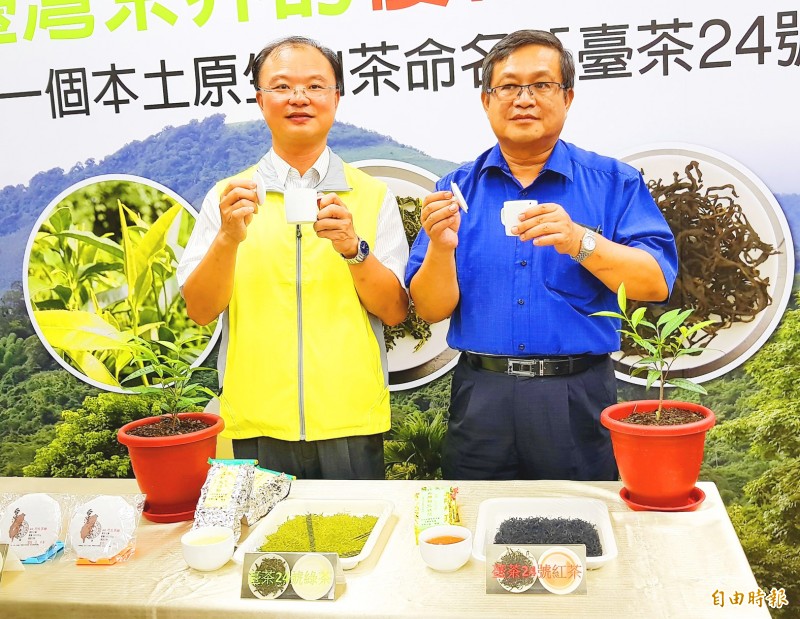《TAIPEI TIMES》 Station unveils new tea plant 19 years in making

The Council of Agriculture’s Tea Research and Extension Station Director Su Tsung-chen, left, displays the new Taiwan Tea No. 24 in Taipei yesterday. Photo: Chien Hui-ju, Taipei Times
By Chien Hui-ju and Sherry Hsiao / Staff reporter, with staff writer
The Council of Agriculture’s Tea Research and Extension Station (TRES) yesterday announced a new variety of tea called Taiwan Tea No. 24 that was developed from an indigenous tea plant dating to the Ice Age.
Known as the “Formosan landlocked salmon of Taiwanese tea,” Taiwan Tea No. 24 is the only purely indigenous variety of the Taiwan Tea series, station director Su Tsung-chen (蘇宗振) said.
Since 2000, the station’s Taitung branch has been conducting research on indigenous tea varieties on Taiping Mountain (太平山) in Taitung County’s Yanping Township (延平), he said.
Using cutting propagation, researchers experimented with domestication, he said, adding that during the breeding period, they continued to explore the feasibility of growing tea plants native to mountainous regions on flat land.
The researchers searched for a native tea species on a mountain nearly 1,200m above sea level, said Yu Chin-an (余錦安), a research assistant at the station who worked on the project.
After 19 years, through various experimental procedures, single-seed selection and a series of comparative tests of superior strains, they have finally cultivated the plant, Yu said.
Taiwan Tea No. 24 is not only outwardly different from tea grown in the mountains in western parts of Taiwan, but also belongs to a different DNA group, the station said.
It is a variant of Camellia sinensis f. formosana and a plant left over from the Ice Age, it said.
It is highly resistant to disease and pests, and its advantages include having strong vigor and high yield, and tolerance to cold and drought, it added.
The aroma of the black tea it produces carries hints of mushroom, almonds and coffee, while the green tea has a citrusy flavor, the station said.
Analysis of its chemical composition showed that the caffeine content of Taiwan Tea No. 24 is far lower than that of Taiwan Tea No. 18 and other varieties, so drinking it would be unlikely to affect sleep quality, it said.
Its leaves contain high levels of free amino acids and relatively low levels of catechins, it said, adding that it can help “soothe the mind” and is less bitter.
The station is to apply for plant variety rights for the tea to initiate the process of technology transfer, it said.
Hualien and Taitung counties would be the first regions where the station promotes the variety, it said.
新聞來源:TAIPEI TIMES

















